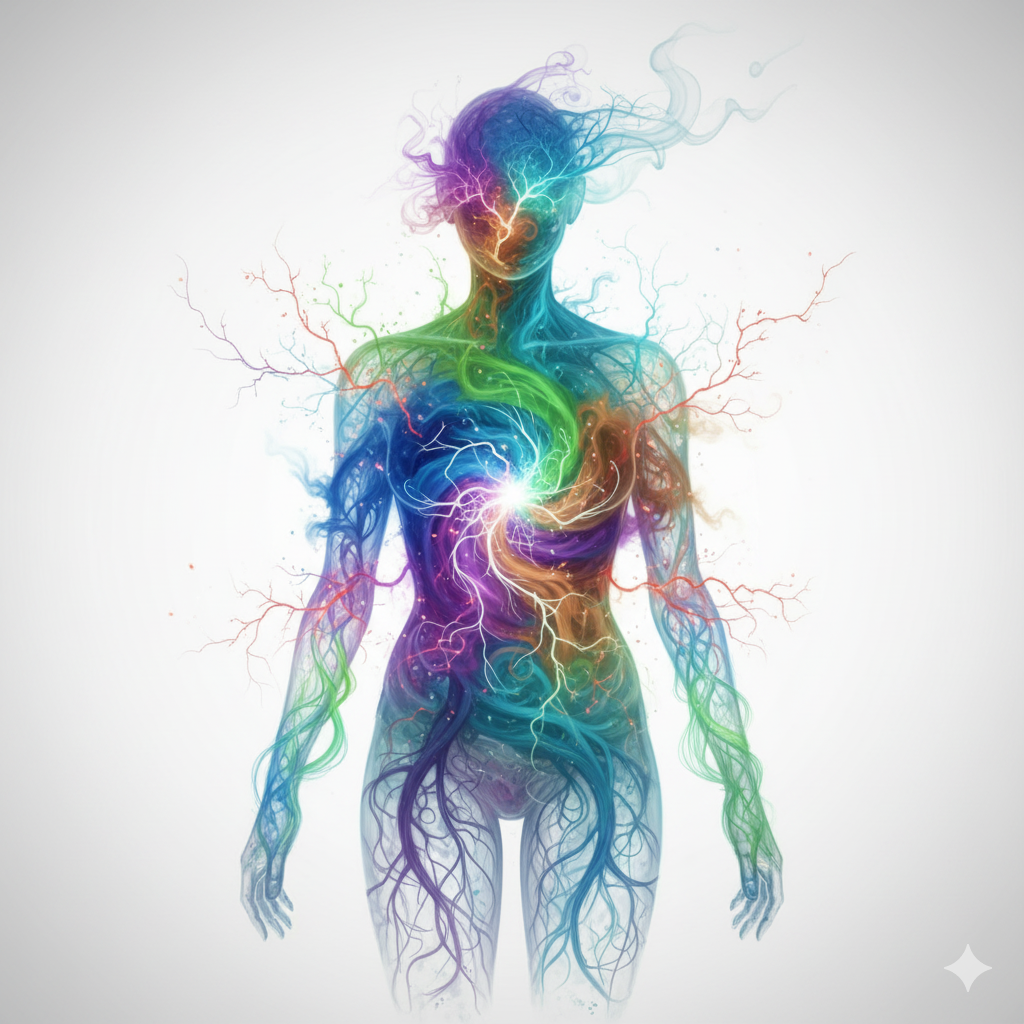
Complex Chronic Illness Management

Beyond the Diagnosis: Recognizing the Overlap
At Evergreen Women & Family Wellness, we understand that your symptoms don't always fit neatly into a single category. You may be living with a complex, overlapping medical picture that is often overlooked. We specialize in recognizing and co-managing with your specialists the interconnectedness of conditions like Mast Cell Activation Syndrome (MCAS), Ehlers-Danlos Syndrome (hEDS), Chronic Inflammatory Response Syndrome (CIRS), and Neurodiversity.
Our approach is to look at the whole person and recognize the profound link between your immune system, connective tissue, nervous system, and brain function.
The Interwoven Conditions We Treat
We recognize that these conditions frequently co-exist, amplifying symptoms and complicating diagnosis.
1
Mast Cell Activation Syndrome (MCAS)
An immune disorder where specialized mast cells inappropriately release large amounts of inflammatory chemicals (mediators).
Core Feature: Uncontrolled, excessive release of inflammatory mediators (like histamine, tryptase).
Common Symptoms: Episodic flushing, hives, severe allergic-like reactions, digestive issues, and cardiovascular symptoms (tachycardia, low blood pressure).
2
Ehlers-Danlos Syndrome (EDS)
A genetic disorder affecting the body's connective tissue due to faulty collagen production, leading to fragility and laxity.
Core Feature: Defective or fragile connective tissue ("the body's glue").
Common Symptoms: Chronic joint pain, frequent joint dislocations/subluxations, overly stretchy and easily bruised skin, and a frequent co-occurrence with POTS (Dysautonomia)..
3
Chronic Inflammatory Response Syndrome (CIRS)
A multisystem, chronic inflammatory state acquired by genetically susceptible individuals exposed to biotoxins (most commonly mold/mycotoxins).
Core Feature: Ongoing, dysregulated inflammation due to an inability to excrete biotoxins.
Common Symptoms: Profound fatigue, severe "brain fog," memory and concentration issues, muscle/joint pain, and increased sensitivity to chemicals..
4
Neurodiversity (ASD, ADHD)
The recognition of natural variations in brain function, including Autism Spectrum Disorder (ASD), ADHD, and dyslexia, which influence sensory processing and executive function.
Core Feature: Natural human variation in neurological development and function.
Clinical Link: Individuals with neurodiversity often have a higher incidence of inflammatory and immune conditions like MCAS and hypermobility/EDS, possibly due to shared genetic predispositions and immune dysregulation.
The Overlap: Why This Matters to Your Care
The most challenging cases often involve the convergence of these illnesses. At Evergreen, we specifically target the common threads binding them together
EDS & MCAS: A highly common co-occurrence. Fragile hEDS connective tissue may mechanically trigger mast cells, leading to inappropriate inflammatory release (MCAS). This results in combined symptoms like chronic pain, joint instability, GI issues, and flushing/allergic reactions.
EDS, MCAS, & Dysautonomia (POTS): This is a frequent triad. hEDS laxity predisposes the nervous system to dysregulation (Dysautonomia/POTS), causing heart rate and blood pressure issues. MCAS inflammation further exacerbates these symptoms (dizziness, fainting).
CIRS & Systemic Inflammation: CIRS: creates chronic, systemic inflammation that the body can't turn off. This directly causes severe symptoms—like fatigue and "brain fog"—seen across all four conditions.
Neurodiversity & Physical Health: Individuals with ASD and ADHD have a higher incidence of inflammatory conditions like MCAS and hEDS. This link may involve shared genetics and immune/neuroinflammation.
Neurological/Psychiatric Symptoms: Chronic inflammation from MCAS and CIRS causes neuroinflammation. This is a proposed mechanism for the high rates of headaches/migraines, anxiety, depression, brain fog, and fatigue observed, especially in neurodivergent individuals.
Management Strategies
-
Management focuses on stabilizing mast cells, blocking mediator effects, and reducing triggers.
Medications:
Mast Cell Stabilizers (e.g., Cromolyn Sodium, Ketotifen) to reduce mediator release.
H1 and H2 Blockers (Antihistamines) to block the effects of histamine.
Leukotriene Inhibitors (e.g., Montelukast) to block other inflammatory mediators.
Short courses of corticosteroids (rarely) to manage severe systemic flares.
Supplements: Vitamin D, Vitamin C, Quercetin, Magnesium, and specific Probiotics.
Lifestyle/Diet: Identifying and strictly avoiding individual food, chemical, or environmental triggers. Implementing a low-histamine diet or elimination diet as appropriate.
Co-Management:
Allergy/Immunology: For advanced diagnostics, medication management, and ruling out primary mast cell disorders.
Gastroenterology: For severe GI symptoms.
-
Management centers on pain control, stability, and symptom management of associated conditions.
Physical Therapy/Occupational Therapy: Focused on proprioception (body awareness), muscle strengthening (to provide joint stability), and avoiding joint stretching.
Pain Management: Non-opioid analgesics, topical compounds, or nerve blocks for chronic pain.
Lifestyle: Low-impact exercise (swimming, cycling) to maintain fitness without excessive joint stress. Pacing activities to manage chronic fatigue.
Treat co-existing illness
Co-Management:
Cardiology/Neurology (Dysautonomia/POTS): For management of heart rate, blood pressure, and autonomic dysfunction (e.g., increased fluids/salt, midodrine, beta-blockers).
Rheumatology: For assessing and managing joint inflammation and ruling out other rheumatological conditions.
Orthopedics: For management of persistent dislocations, instability, or surgical interventions (when necessary and carefully considered).
-
Integrative management is a phased approach: Remove the Toxin, Eliminate the Burden, and Correct the Damage.
Environmental Toxin Removal (Foundational):
Source Elimination: Critical step of professionally identifying and remediating all sources of biotoxins (mold, mycotoxins) in the living/working environment.
Strict Avoidance: Immediate and ongoing avoidance of confirmed Water-Damaged Buildings (WDBs) until clearance testing is complete.
Biotoxin Elimination (Binding Phase):
Pharmaceutical Binders: Use of prescription bile acid sequestrants (e.g., Cholestyramine, Welchol) to bind toxins in the gut for excretion.
Supportive Agents: Adjunctive use of natural binders (e.g., charcoal, chlorella) as tolerated.
Correcting Inflammatory Dysregulation:
Targeted Interventions: Addressing specific diagnostic deficiencies (e.g., low VIP) with targeted medications (e.g., intranasal spray) and replacing necessary hormones (e.g., for pituitary/adrenal axis dysfunction).
Immunomodulation: Utilizing low-inflammatory diets (often low-amylose), gut support, and specific supplements to calm the chronic inflammatory cascade.
Supportive & Symptomatic Care:
Nervous System Regulation: Techniques to stabilize the autonomic nervous system and manage symptoms of dysautonomia (e.g., targeted breathing exercises).
Cognitive Support: Referral for specialized cognitive therapy to address severe "brain fog" and memory issues.
Co-Management:
Environmental Specialist: For initial testing and successful remediation.
Endocrinology: For complex hormone deficiencies resulting from chronic systemic inflammation.
-
Management is about leveraging individual strengths, accommodating differences, and treating co-occurring medical/psychiatric issues.
Occupational/Sensory Integration Therapy: To help manage sensory processing differences and improve functional skills.
Executive Function Coaching: Strategies and tools to support planning, organization, and attention (especially for ADHD). Specific coaching for parents helping neurodiverse children is also available.
Medication Management: Treatment of co-occurring conditions like anxiety, depression, or ADHD with appropriate psychotropic medications or supplements.
Addressing Physical Comorbidities: Aggressive treatment of underlying MCAS, hEDS, and CIRS, as the resulting pain, fatigue, and inflammation can significantly exacerbate neurological symptoms (e.g., irritability, meltdowns).
Co-Management:
Psychiatry/Therapy: For specialized cognitive-behavioral or neuro-affirming therapies and medication management.


